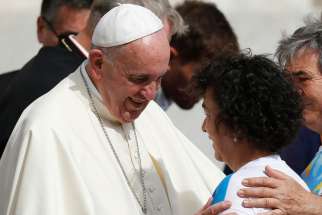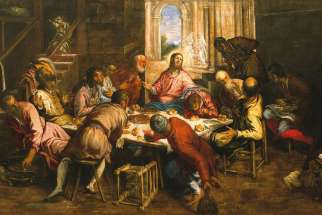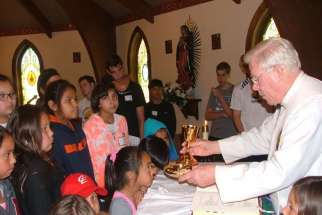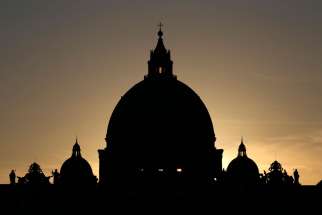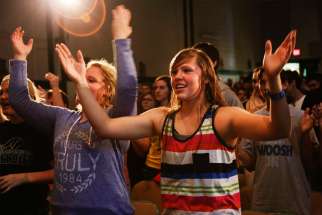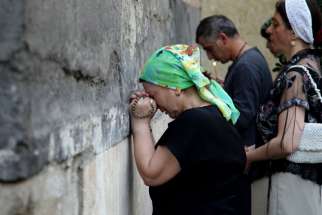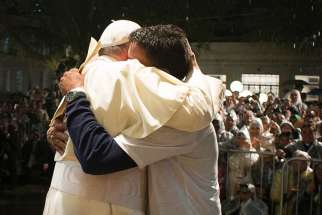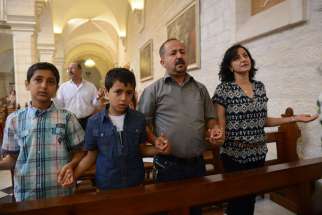Like the innocent child, we must be open to the kingdom of the Lord
27th Sunday in Ordinary Time (Year B) Oct. 4 (Genesis 2:7ab, 15, 18-24; Psalm 128; Hebrews 2:9-11; Mark 10:2-16)
Adam means of the earth, and that is part of what we are. In this symbolic teaching story — Adam and Eve were not historical individuals — Adam was created from the ground itself. God breathed the spirit into Adam and he became a living being. A long parade of living creatures followed, and Adam named them all, implying power over them. But living beings were created for companionship and relationship, and the lack of that was soon evident. Eve was created from Adam, but that does not imply dependence or inferiority.
God’s Spirit rests upon whom it chooses
26th Sunday in Ordinary Time (Year B) Sept. 27 (Numbers 11:25-29; Psalm 19; James 5:1-6; Mark 9:38-43, 45, 47-48)
Religion is all about power — that is the judgment of many cynics and skeptics. While this is too harsh a judgment and suffers from a lack of nuance and balance, it contains an element of truth. People sense the power and energy that flows from a close relationship with God and they guard it jealously. Boundaries and rules are established, as well as ways of determining who is in or out, worthy or unworthy. Tight control is maintained over who is allowed to exercise power.
All are equal in the eyes of the Lord
25th Sunday in Ordinary Time (Year B) Sept. 20 (Wisdom 2:12, 17-20; Psalm 54; James 3:16-4:3; Mark 9:30-37)
Why was Wisdom’s holy and righteous man such an inviting target? One would think that an inspiring example of goodness and righteousness would be welcome. But truly upright individuals generate a lot of resentment, guilt and anger. Their presence can provoke a nagging sense of what we could or should be.
Faith without physical expression is not faith
24th Sunday in Ordinary Time (Year B) Sept. 13 (Isaiah 50:5-9; Psalm 116; James 2:14-18; Mark 8:27-35)
There is no shortage of individuals claiming to be agents and proclaimers of God’s will. Unfortunately, many of them represent nothing more than their own opinions, fears, prejudices and desires. Stripped of the cloak of God-talk, their words, thoughts and actions usually have little if anything to do with God. Often they divide or exclude people, stir up negative thoughts and emotions, and even end in violence that they believe is divinely sanctioned.
God is patient, merciful in action
Second Sunday of Advent (Year B) Dec. 7 (Isaiah 40:1-5, 9-11; Psalm 85; 2 Peter 3:8-14; Mark 1:1-8)
Anyone who has accompanied someone who is deep in grief or suffering knows how difficult it is to find the right words. In fact, most of the time it is better to say very little — presence and comfort go a long way. Above all, explanations or “answers” are seldom helpful.
The shepherd always looks after His flock
Christ the King (Year A) Nov. 23 (Ezekiel 34:11-12, 15-17; Psalm 23; 1 Corinthians 15:20-26, 28; Matthew 25:31-46)
There are many models of power and authority in the world but far too many of them are based on brute force, authoritarianism and domination. When coupled with a powerful ideology, they have enslaved millions and been the cause of countless deaths. There are less dramatic forms that constrict thought and expression or seek to control the lives of others.
‘The Gospel without joy is not the Gospel’
30th Sunday in Ordinary Time (Year A) Oct. 26 (Exodus 22:21-27; Psalm 18; 1 Thessalonians 1:5c-10; Matthew 22:34-40)
Remember who you were and what it felt like to be abused and oppressed. Exodus addressed this admonition and guidance to the Israelites but it is also meant for us. The people of Israel were reminded to remember the bitterness and suffering of slavery in Egypt in all of their dealings with other people. It is a variation on the Golden Rule — if you didn’t like the way you were treated, then don’t treat others in the same manner.
Give to God that which is His
29th Sunday in Ordinary Time (Year A) Oct. 19 (Isaiah 45:1, 4-6; Psalm 96; 1 Thessalonians 1:1-5ab; Matthew 22:15-21)
Who are the “good guys” and “bad guys” in our world? We are prone to dividing the world into the sheep and the goats and attaching the appropriate tags. It can be rather satisfying, and it doesn’t take much reflection or discernment. A mere negative visceral reaction to someone is usually sufficient grounds for a damning label.
The right path is the just path
27th Sunday in Ordinary Time (Year A) Oct. 5 (Isaiah 5:1-7; Psalm 80; Philippians 4:6-9; Matthew 21:33-43)
The prophets of Israel had an array of instruments at their disposal in their struggle to reform the nation. Symbolic behaviour — a form of street theatre — was one such technique, and it was very effective in the hands of someone like Jeremiah.
Receive the Gospel joyfully
26th Sunday in Ordinary Time (Year A) Sept. 28 (Ezekiel 18:25-28; Psalm 25; Philippians 2:1-11; Matthew 21:28-32)
No one is responsible for anything — we are all victims. If that sounds strange, that’s because it is — and yet it is one of the attitudes present in our culture. If we get in a scrape, the blame lies elsewhere — society, upbringing, personality disorders and genetics — but not with us. Even God is sometimes blamed, or accused of being unfair. God’s job is to give us a smooth, easy, and happy life and to respond to our demands.
God does not play by human rules
25th Sunday in Ordinary Time (Year A) Sept. 21 (Isaiah 55:6-9; Psalm 145; Philippians 1:20-24, 27; Matthew 20:1-16)
It is often said that God is merely a projection of human wishes and fears. An ancient Greek philosopher once said that if cows, horses and lions had hands and could draw, they would depict gods that looked just like them.
Christ is the cure for what ails humanity
Exaltation of the Holy Cross Sept. 14 (Numbers 21:4-9; Psalm 78; Philippians 2:6-11; John 3:13-17)
It would be a safe bet to offer $10 to anyone in a group able to explain the Feast of the Exaltation of the Holy Cross. In the fourth century, it commemorated the discovery of Christ’s cross by St. Helena, the Emperor Constantine’s mother. The Eastern Churches tied it to Emperor Heraclius’ recovery of the relic of the cross from Persian captivity in the seventh century. Take your pick!
Peace comes with submitting to God
22nd Sunday in Ordinary Time (Year A) Aug. 31 (Jeremiah 20:7-9; Psalm 63; Romans 12:1-2; Matthew 16:21-27)
We can perhaps sympathize with Jeremiah. He did not ask for the calling of a prophet — in fact, he was dragged kicking and screaming into his role as God’s mouthpiece.
No favourites, only justice, compassion
21st Sunday in Ordinary Time (Year A) Aug. 24 (Isaiah 22:15, 19-23; Psalm 138; Romans 11:33-36; Matthew 16:13-20)
No one has an absolute right to a position of trust and authority. Along with authority there is responsibility and accountability, and however slowly the wheels of justice turn they grind exceedingly fine. Shebna discovered this to his chagrin when he was fired by one against whom there is no appeal — God. The people of Israel believed God raised up individuals to govern the nation, but they were also positive God could and would dismiss anyone who abused that trust.
Faith is in opposition to fear and doubt
19th Sunday in Ordinary Time Aug. 10, (1 Kings 19:9, 11-13; Psalm 85; Romans 9:1-5; Matthew 14:22-33)
To many people God seems absent from our world. Often it is difficult to discern the presence of God in one’s own life. Part of the reason is that our perception of God is filtered through far too many expectations. We have set ideas about how God is to be revealed and they are usually dramatic, flashy and filled with displays of power — all fine material for Hollywood biblical epics. Compounding the problem is the tendency of ancient peoples to assign manifestations of nature to the immediate hand of God. Our scientific understanding of the natural order would prevent most of us from seeing the hand of God in an earthquake, hurricane or tsunami.


